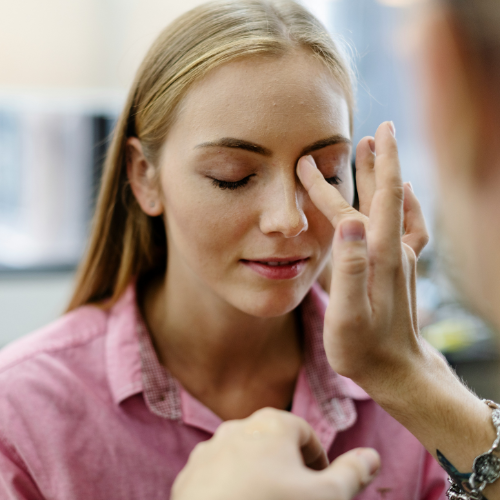Our eyes are among the most vital and complex organs in our bodies, allowing us to experience the world around us in rich detail. Maintaining good eye health is crucial for preserving vision and overall quality of life.
Understanding Eye Health
Eye health encompasses several aspects, including:
Visual Acuity: The clarity and sharpness of vision.
Eye Comfort: Absence of discomfort, dryness, or irritation.
Disease Prevention: Avoiding and managing eye diseases and conditions.
Functional Performance: The ability to perform daily activities effectively, such as reading, driving, and recognizing faces.
Common Eye Problems and Conditions
Refractive Errors: These are the most common vision problems and include:
Myopia (Nearsightedness): Difficulty seeing distant objects clearly.
Hyperopia (Farsightedness): Difficulty seeing close objects clearly.
Astigmatism: Distorted or blurred vision due to an irregularly shaped cornea.
Presbyopia: Age-related difficulty in focusing on close objects, often starting in the 40s.
Dry Eye Syndrome: A condition where the eyes do not produce enough tears or the tears evaporate too quickly, leading to dryness, irritation, and redness.
Cataracts: Clouding of the eye’s lens, leading to blurred vision. Cataracts are common with aging but can be managed with surgery if necessary.
Glaucoma: A group of eye conditions that damage the optic nerve, often associated with increased intraocular pressure. It can lead to vision loss if not managed.
Macular Degeneration: An age-related condition affecting the macula, the central part of the retina, leading to loss of central vision.
Diabetic Retinopathy: Damage to the blood vessels in the retina caused by diabetes, which can lead to vision impairment or loss.
Conjunctivitis: Inflammation of the conjunctiva, often caused by infections or allergies, leading to redness, itching, and discharge.
Maintaining Healthy Eyes
Get Regular Eye Exams: Comprehensive eye exams are crucial for detecting vision problems and eye diseases early. Adults should have their eyes examined every 1-2 years, or more frequently if recommended by an eye care professional.
Protect Your Eyes from UV Rays: Prolonged exposure to ultraviolet (UV) light can damage your eyes and increase the risk of cataracts and macular degeneration. Wear sunglasses that block 100% of UV rays and a wide-brimmed hat for additional protection.
Follow the 20-20-20 Rule: To reduce eye strain from prolonged screen use, follow the 20-20-20 rule: every 20 minutes, look at something 20 feet away for at least 20 seconds.
Maintain a Healthy Diet: Eating a diet rich in vitamins and nutrients supports eye health. Include foods high in antioxidants, such as leafy greens (e.g., spinach, kale), citrus fruits, nuts, and fish rich in omega-3 fatty acids (e.g., salmon, sardines).
Stay Hydrated: Adequate hydration is important for maintaining tear production and preventing dry eyes. Drink plenty of water throughout the day.
Practice Good Hygiene: Avoid touching your eyes with unclean hands and ensure that makeup brushes and contact lenses are clean. Remove makeup before sleeping to avoid irritation.
Manage Health Conditions: Conditions such as diabetes and hypertension can impact eye health. Manage these conditions through proper treatment and regular check-ups with your healthcare provider.
Use Proper Lighting: When reading or working on a computer, use appropriate lighting to reduce eye strain. Avoid glare from screens and position your light source behind you.
Exercise Regularly: Regular physical activity promotes overall health and can help reduce the risk of certain eye conditions, such as hypertension-related eye issues.
When to Seek Professional Help
Seek medical attention if you experience any of the following symptoms:
- Sudden vision changes, such as blurred or double vision.
- Persistent eye pain or discomfort.
- Redness, swelling, or discharge from the eyes.
- Difficulty seeing at night or seeing halos around lights.
- Floating spots, flashes of light, or a curtain-like shadow in your vision.
Emerging Trends in Eye Health
Telemedicine for Eye Care: Advances in telemedicine are making eye care more accessible. Remote consultations and diagnostic tools allow for early detection and management of eye conditions.
Advancements in Contact Lenses: New technologies in contact lenses, such as lenses that monitor glucose levels or correct presbyopia, are enhancing comfort and vision correction.
Genetic Research: Ongoing research into genetic factors affecting eye health may lead to personalized treatments and preventative measures for eye diseases.
Innovative Treatments: Advances in treatments, such as gene therapy for inherited retinal diseases and novel drug therapies for conditions like glaucoma, are improving outcomes for patients.
Maintaining eye health is essential for preserving vision and ensuring a high quality of life. By adopting healthy habits, staying informed about eye conditions, and seeking regular professional care, you can safeguard your vision and address any issues promptly. With ongoing advancements in eye care, staying proactive about your eye health will help you enjoy clear, comfortable vision throughout your life.


